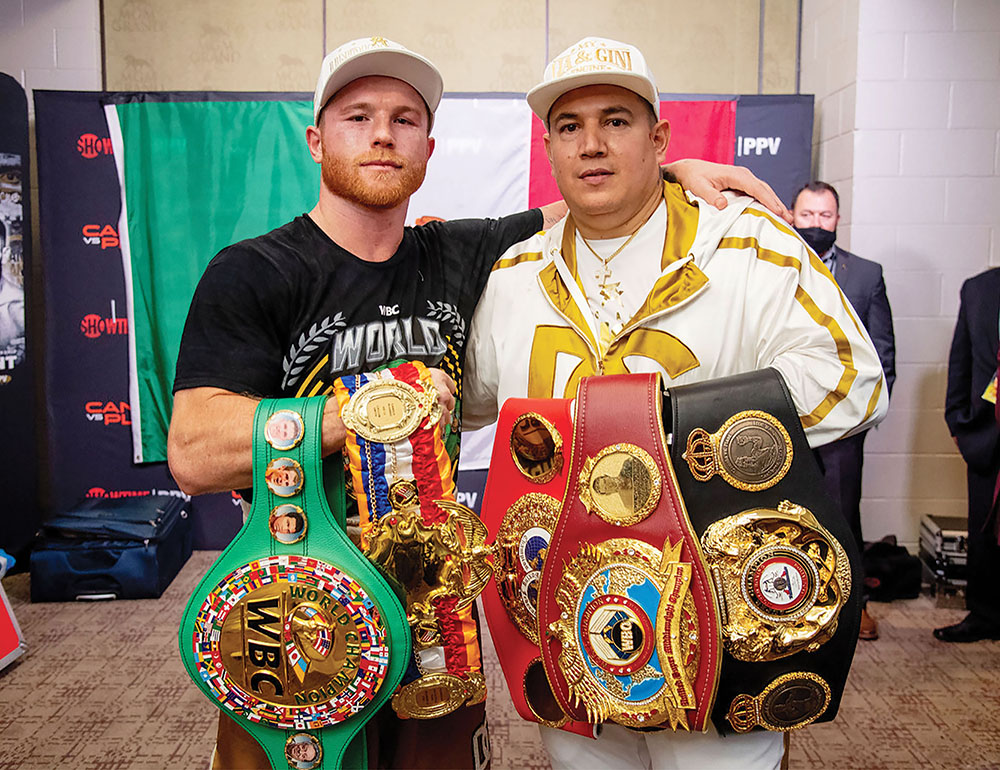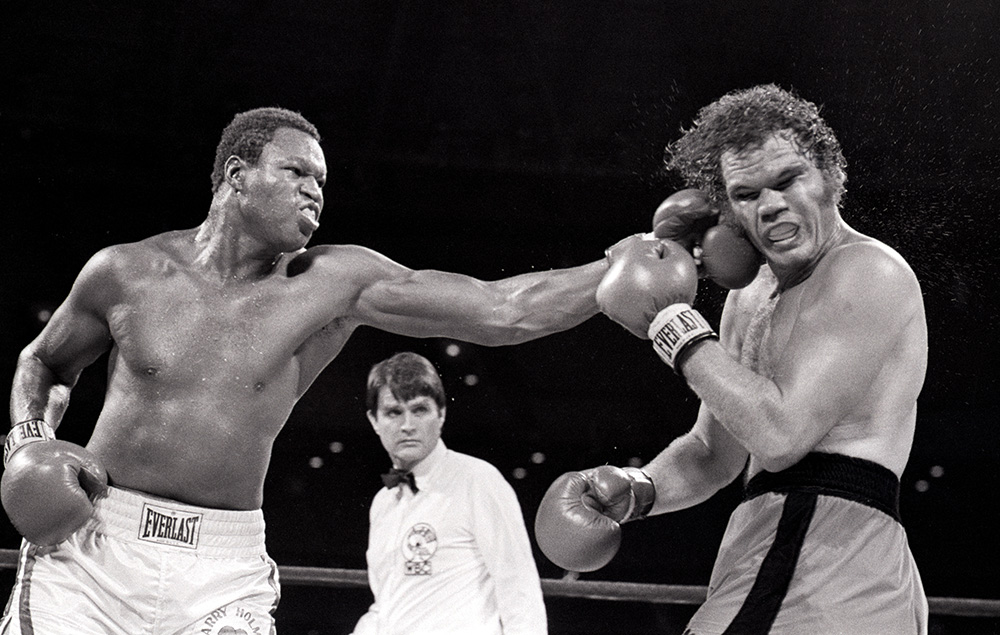And Then There Were Three

Thirty nine years ago (November 25, 1983) Larry Holmes defended the Ring Magazine heavyweight title with an opening-round stoppage of Marvis Frazier. The WBC title that he had defended 16 times was not on the line. The next time he entered the ring, vs. James “Bonecrusher” Smith one year later, he made the inaugural defense of the IBF heavyweight title and helped usher in boxing’s three-belt era.
Cliff Rold explains how it all went down in this article, which was originally published in the May 2022 edition of The Ring magazine (AKA the “Larry Holmes special issue“).
HOLMES’ DECISION TO FIGHT FOR THE IBF TITLE WAS A PIVOTAL MOMENT IN BOXING’S EVOLUTION TOWARD THE BELT-JAMMED LANDSCAPE OF TODAY
To the chagrin of boxing purists, today’s boxing can be referred to as the four-belt era. With franchise, super, regular and interim belts around, fans are lucky if any weight class is whittled down to just four fighters claiming to be champion.
Despite the clutter, for a large section of boxing’s business and fandom, the idea of “undisputed” maintains value. What does undisputed mean in 2022?
Its popular definition in the four-belt era relies on a fighter holding the International Boxing Federation (IBF), primary World Boxing Association (WBA), World Boxing Council (WBC) and World Boxing Organization (WBO) belts.

It takes two people to hold a complete belt collection these days.
Canelo Alvarez, Josh Taylor, Jessica McCaskill and Katie Taylor are undisputed champions right now. They collected all the hardware. They stand apart from their peers.
It didn’t always take so many belts.
Boxing has always had pockets with fractured title scenes, but there was more consensus about the world champions in earlier eras.
The first title reign of Muhammad Ali was a sign of things to come. Ali was stripped of the WBA title twice in his first title reign. The Ring maintained recognition of Ali after 1967 despite his exile from boxing, while the WBA crowned Jimmy Ellis its champion and New York crowned Joe Frazier. The Ring recognized the winner of Frazier-Ellis in 1970 after Ali briefly retired.
The heavyweight title remained intact after that.
For a time.
The evolution of boxing’s title scene as we know it today was already well under way. The WBC was born in 1963 and gradually began to separate from the WBA with its own champions and contenders. By the 1970s, the two-belt era had fully arrived.
Larry Holmes would benefit from it.
Leon Spinks upset Muhammad Ali for the championship in February 1978 and went straight into a rematch, ignoring the WBC’s mandate that he face Ken Norton, who had won an eliminator versus Jimmy Young in 1977. The WBC thus gave the title to Norton and Holmes defeated him, though Spinks was widely recognized as the real champ.

Following Leon Spinks’ shocking upset of Ali, the championship was split for the first time in years. (Photo by Ron Galella/Ron Galella Collection via Getty Images)
Ali regained the honor from Spinks in their rematch while Holmes rose to No. 1 in The Ring’s rankings through five defenses of the WBC title. The third of those defenses made all the difference for Holmes in assuming his place as the true king at heavyweight.
In the June 1980 issue of The Ring, the magazine elevated Holmes to champion not on the strength of his sixth title defense, against Leroy Jones, but on the results of the other big heavyweight fight on March 31, 1980.
That day, Mike Weaver knocked out John Tate for the WBA title. Holmes had stopped Weaver in his third defense of the WBC belt. And so it was written that, “With this issue Ring hereby recognizes Larry Holmes’ claim as the Heavyweight Champion of the World. Not because he is the WBC claimant, but because he won his title in the ring with his victory last June 22nd over the WBA title claimant, Mike Weaver. That’s where titles are won and lost — in The Ring!”
Boxing has always had pockets with fractured title scenes, but there was more consensus about the world champions in earlier eras.
Later in 1980, Holmes would defeat Ali, history’s previous champion, to further cement his hold on the throne. While Holmes never unified the WBA and WBC belts, he continued to run up his title defense totals under the WBC umbrella, including the high of winning one of the richest prizefights of all time in his 1982 victory over Gerry Cooney.
The in-ring experience for Holmes varied after Cooney. Randall “Tex” Cobb and Lucien Rodriguez were up next. Cobb was a decent fringe contender and lasted all 15 rounds, but their contest was a mismatch. The legacy of Holmes-Cobb is its impact outside the ring, as a catalyst for Howard Cossell’s exit from calling professional fights.

Randall “Tex” Cobb survived 15 rounds but absorbed terrible punishment for the privilege.
Rodriguez would be the first defense of Holmes’ career against a fighter not ranked in The Ring’s top 10, and Holmes again went the distance, winning a 12-round shutout. It was followed by the longest night of the Holmes reign to that point.
On May 20, 1983, “Terrible” Tim Witherspoon, a veteran of just 15 professional contests, ran neck-and-neck with Holmes all night long.
Earnie Shavers and Renaldo Snipes had both hurt and dropped Holmes in title fights. Those were moments of high drama, but Holmes came back to win each by stoppage and was well ahead on points when he did. Witherspoon often outjabbed the master jabber, closed his left eye and built a lead before a rally from Holmes – and a little luck with the judges – saw the champion escape with a 12-round split decision. It was a bruising, classic affair that, according to Holmes, had him pondering retirement.
In his autobiography, Against the Odds, written with Phil Berger, Holmes stated that retirement thoughts “changed abruptly when a pair of promoters, Murad Muhammad and Bob Andreoli, offered me $5 million for a two-fight deal – Scott Frank and Marvis Frazier. That was, I thought, practically like white collar crime. Easy money. Found money.”
Nothing is ever easy in boxing. Holmes, then 33, and promoter Don King had different interests. To get his “found money,” Holmes wrote that “the hitch … was convincing King to butt out so I could sock away these easy paydays without his getting a taste. What’s more, I had promised King that I would fight another heavyweight of his, Greg Page. Both Page and King were concerned that at my age, who knows – maybe the worst would happen and either Frank or Frazier would knock me off.”
Little did Holmes know that he was about to play a critical role in launching boxing’s three-belt era.
Prior to 1983, the WBA and WBC were the only sanctioning organizations. Greg Page was the mandatory challenger for Holmes’ WBC title. However, Holmes wanted more independence and didn’t want to fight Page before easier money could be collected.
By the end of 1983, Holmes had changed allegiance from the WBC to the nascent IBF and boxing had three sanctioning bodies with their own heavyweight champ.
Read “The Real Heavyweight Championship of the World and Its History” by Lee Groves
The Frank fight went forward and Holmes handled it with ease, stopping Frank in five lopsided rounds in September 1983. It would be Holmes’ 16th and final defense of the WBC crown. Holmes was intent on taking the Frazier fight. It wasn’t competitive on paper. Frazier was just 10-0 with wins over aged veteran Joe Bugner and fellow undefeated prospect James Broad to his credit. Any appeal was as a clash between Holmes and the son of former heavyweight champion Joe Frazier.
King and the WBC had other ideas.
Holmes recalled in Against the Odds:
A week before the Frazier fight, the WBC held its annual convention in Vegas, where Holmes-Frazier was to take place. Earlier, Sid Rogich, the WBC’s VP, told me his championship committee would strip me of my title if I fought Frazier instead of taking my mandatory bout against Page. Rogich had once been the chairman of the Nevada boxing commission and was used to ramrodding his decisions through. Seemed to me he was still bugged about not being able to stop me from fighting the Frenchman, Rodriguez. And who knows? Maybe he was acting on the urging of Donald King. King and the WBC – hell, they were tighter than canned sardines. Anyway, I had hardly set my bags down in Vegas when here comes the little senor, [WBC head Jose] Sulaiman, to give me a lecture on ingratitude. All that the WBC had done for me … why wasn’t I grateful? I told him: “Jose, what about all I did for the WBC? What about my staying in it and being its champion all these years? And what about all the damn kickbacks I paid?” He said, real deadpan – as only Jose could – “Kickbacks? What’s a kickback?” It was an Oscar-winning performance.
Holmes-Frazier went forward without the WBC belt on the line (though the Ring Magazine championship was). Holmes stopped Frazier in the first, notching another defense of history’s crown. Pat Putnam reported in Sports Illustrated that “the attractiveness of the bout wasn’t enriched when Jose Sulaiman, the generalissimo of the World Boxing Council, decreed that he would not recognize it as Holmes’s 17th defense of his WBC title. It was rumored that Sulaiman would have sanctioned the fight if Frazier, should he have won, had given the option on his first title defense to promoter Don King. But since the rumor was vehemently denied by all parties involved, there’s no sense in repeating it.”

Homes took down Frazier in less than three minutes.
Reporting for The Washington Post, David Reminck wrote, “The bout was not sanctioned by the WBC, but the organization said it would have stripped Holmes of his title had he lost … Holmes, 34, who weighed in at 219 pounds, is unbeaten in 45 fights. He told the younger Frazier afterward, ‘I don’t want to do this any more.’ Later, Holmes said he considered himself retired, ‘until a better offer comes along.’ Graciously, he said he would take $100 million to fight the World Boxing Association’s champion, Gerrie Coetzee of South Africa.”
Interviewed in the February 1984 issue of The Ring, King made his case about the Holmes-Page situation. Asked if he was willing to further delay Page’s shot to make Holmes-Coetzee, King said no. “Had Larry Holmes come to me from the very beginning, and we had both made a deal with Page, before Scott Frank or Marvis Frazier, it would have been a different story. However, after Larry Holmes has defected, and fought Scott Frank, I think it’s a disgrace to himself. The WBC title is what really made Larry Holmes, not Larry Holmes making the WBC title.” King stated he would consider a unification showdown with Coetzee, whom King also had promotional ties to, after a Holmes defense against Page.
For the newborn sanctioning body, it was a coup. No matter what other belts were around, Larry Holmes was the recognized heavyweight king.
While the heavyweight drama was unfolding, a new player was born. When Bob Lee failed in a bid to become WBA president earlier in the year, he led a move to establish a new sanctioning body. In May, the newly formed USBA-International gave sanction to Marvin Hagler-Wilfred Scypion. By the end of the year, the USBA-I had rebranded and Lee and the IBF had another important champion in their fold.
On December 12, 1983, the Associated Press reported:
Larry Holmes resigned his World Boxing Council heavyweight title today and said he would fight as champion of the fledgling International Boxing Federation. The 34-year-old Holmes, who has been champion since 1978, made the announcement on the final day of the W.B.C.’s convention at Caesars Palace, and Jose Sulaiman, the council president, accepted the resignation. Holmes relinquished the title just as the W.B.C. was to approve a compromise that would have ordered arbitration to resolve Holmes’s dispute with the promoter Don King over a mandatory defense against No. 1-ranked Greg Page. Sig Rogich, the council’s vice president, said that Page would fight No. 2-ranked Tim Witherspoon for the vacant title. The fight is expected to be held Feb. 24 at a site to be determined.
Just like that, two belts were three. Holmes recounted, “When I’d blown off the WBC, I’d approached the IBF about being its heavyweight champion. Quicker than you could say Sulaiman, the IBF agreed.”
For the newborn sanctioning body, it was a coup. No matter what other belts were around, Larry Holmes was the recognized heavyweight king. It has been and always will be a special position in boxing. It’s the zenith, the flagship position, of the sport. The IBF securing Holmes as their champion was a move toward fast credibility, and they wisely also married themselves to light heavyweight Michael Spinks, welterweight Donald Curry and junior welterweight Aaron Pryor as their inaugural champions in those weight classes.
Spinks and Hagler were already recognized as undisputed. Curry would go on to unify the division completely. Pryor was the recognized leader of his class before a brief sojourn from the sport.
Columnist Michael Katz addressed the various interests at play in the March 1984 issue of The Ring. Katz noted that Page was a worthy contender:
[Page] did not applaud Larry Holmes, nor condemn him, for doing what is best for Larry Holmes, even if it goes against the worthiest principles of the World Boxing Council constitution: Champions should and must defend their titles against the best challengers. Holmes instead told the WBC to take back its $1.99 belt. He will not defend it against the mandatory challenger, Greg Page, for the starvation wage of $2.5 million. At the age of 34, Larry has grown wise to the fact that $8 million buys more groceries than $2.5 million and is opting to arrange a bout with Gerrie Coetzee, the heavyweight champion of the world according to barf (also known as the World Boxing Association). So when a new WBC champion emerges from a bout between Page and Tim Witherspoon, then there will be three, Holmes having picked up the unnecessary sanctity of the International Boxing Federation.
Holmes wouldn’t defend the IBF title for almost a year. Coetzee never happened. Witherspoon beat Page for the vacant WBC belt in March 1984, then lost it to Pinklon Thomas in his first defense in August. Page, who followed his loss to Witherspoon with a loss to David Bey, knocked out Coetzee in December 1984 for the WBA strap just weeks after Holmes made his return.
via Vintage Boxing on YouTube:
On November 9, 1984, boxing was treated to the first heavyweight title bout of the three-belt era as Holmes overcame a cut and some stunning bombs, stopping James “Bonecrusher” Smith in 12 rounds to defend the IBF belt for the first time. King was there to promote it.
KO Magazine opened its coverage of the contest in the March 1985 issue with respect for the long tenure of Holmes:
In the long and sprawling novel that has been Larry Holmes’ heavyweight championship reign, a predominant theme has emerged. When the undefeated titlist is retired or beaten or stripped of all world titles because of the length of his fights or the ranking of his opponents or the color of his trunks, some boxing fans will point to his two most important defenses, against Muhammad Ali and Gerry Cooney, and say, “Helluva fighter, helluva champ.” But others, those who understand the fighter in the ring and the fight in the man, will point to Earnie Shavers, Mike Weaver, Renaldo Snipes, Tim Witherspoon, and Bonecrusher Smith. Against each of those challengers, a fighter who turned pro with the reputation of a quitter was weakened and tested in a way all champions must eventually be tested. In all of those struggles, Holmes’ title belt began to stretch from his corner diagonally across the ring. But it never snapped. Each time, Larry Holmes was one punch away from the end. We’re still waiting for that one punch to land. The matter of when it does is what the conclusion of the novel is all about.
At the dawn of the three-belt era, the Holmes novel was just pages away from matching Rocky Marciano’s mark of 49-0.
***















